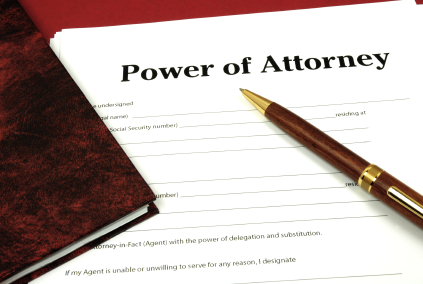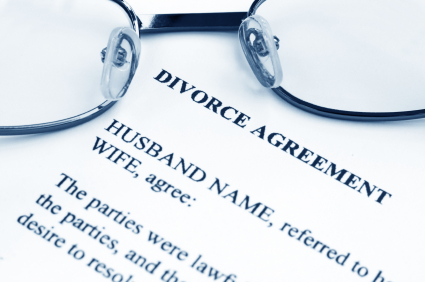
Whether it’s a sad indictment of relationships today or a sign that the stigma associated with divorce is on the wane, but divorce rates, particularly amongst older couples, are on the up. Based on the most recent figures, 39 % of those couples who marry today will divorce.
When a marriage does end in divorce, it is a common gripe of fathers that they do not feel their rights are properly protected in law. And to an extent they’re right, depending on whether the parent has Parental Responsibility for the children or not. Parental Responsibility determines your duty of care for your child and your obligation to protect them.
In divorce cases, the vast majority of fathers are desperate to remain as actively involved in the upbringing of their children as they can once the divorce has been settled. This can cause much frustration and leads fathers doubting their rights and responsibilities. More...

What is an Enduring Power of Attorney (“EPA”)?
An EPA is an instrument that could be made before 1st October 2007. It enables a person (“the Donor”) to appoint an Attorney or Attorneys to act on his or her behalf and make decisions in relation to his/her property and financial affairs.
What is a Lasting Power of Attorney (“LPA”)?
LPA’s were introduced by the Mental Capacity Act 2005. They replaced EPA’s and have been in force since 1st October 2007. EPA’s made before that date are still valid.
There are two types of LPA, a property and financial affairs LPA (“LPA PA”) and a health and welfare LPA (“LPA HW”). It is possible for someone to make just one or both types.
The LPA PA enables the attorney to make decisions in relation to the Donor’s property and financial affairs, like its predecessor the EPA. The LPA HW, on the other hand, enables the Attorney to make decisions about day to day welfare issues, and about medical treatment.
What is Registration?
If the Donor loses mental capacity the Attorney is under a duty to register the EPA with the Office of the Public Guardian (“the OPG”).
As a part of the process, certain people should be notified of the situation, by the Attorney and the OPG and they will be entitled to lodge any objection they have to the application.
The idea is that those who are notified will bring to the attention of the OPG any issues which suggest that the Attorney is not, or is no longer, an appropriate person to make decisions on behalf of the Donor.
The notification from the OPG may be the first thing that a friend or relative hears about the EPA or LPA. This can, of course, lead to some concern.
Why Object?
Those who receive notification are the last line of defence to protect the Donor from an inappropriate Attorney. If you have received a notification and are concerned about the EPA or LPA you should seek immediate legal advice. You only have a limited time to register your objection.
It is not appropriate to object just because you do not like the Attorney. Rather, an objection should only be advanced if your suspicions/concerns fall into one of the following:
1. You think that the EPA or LPA is not valid - i.e. the Donor did not have mental capacity at the time the document was signed, or, you think the document is a forgery.
2. You think that the EPA or LPA was revoked by the Donor before he/she lost capacity.
3. You suspect that fraud or undue pressure was used to induce the Donor to make the EPA or LPA.
4. You think that there are compelling other reasons why the Attorney should not make decisions for the Donor. I.e. the Attorney has been declared bankrupt or convicted of a criminal offence.
What if the EPA/LPA is Already Registered?
It is possible to make an application for the cancellation of a registered EPA or LPA in certain circumstances, particularly if you think:
1. Fraud or undue pressure was used to induce the Donor to create the EPA or LPA.
2. The Attorney is unsuitable i.e. due to bankruptcy, criminal convictions, dishonesty, a conflict of interest with the Donor.
What Else Can Be Done?
The OPG has a Safeguarding Unit and if you have some suspicion, but not enough to merit making a formal application to revoke an LPA or EPA, you can make a report to the Safeguarding team and they will then likely investigate the Attorney and try and establish whether he or she is appropriate for the role, and acting in the best interests of the Donor.
If you become aware that a friend or relative is being financially or in any other way abused by their Attorney, you should contact us and we will help you navigate the complex legal process.

Call Howells Solicitors today on 0808 178 2773.
by Tristan Lewis

Every year, hard-working people who have strived all their lives to pay for their family home are seeing their hard work count for nothing, as their homes are sold to meet the cost of care in later life.
Research shows that half of women and a third of men will require some form of long-term care. It is this, in some cases the exorbitant cost of residential care, which means thousands of people are unable to pass their family home down to their children.
What happens to homeowners entering a care home?
If you own your home the local authority will not count it as capital until you have been receiving residential care or living in a nursing home for 12 weeks. After this point, your home will still not be classed as capital if any of the following still reside there: More...

Over the years there has been a generational shift in the approach we have to marriage and divorce. This can be evidenced by the latest figures from the Office of National Statistics (ONS), which show that the current divorce rate is the lowest it has been for nearly 40 years.
Couples in the UK are now choosing to marry later in life and consequentially, the added maturity that comes with age is resulting in fewer separations.
In 1960 there were just 23,868 cases of divorce. At this time there was still much stigma attached to divorce. During the 1970s divorce became increasingly common with the introduction of so called ‘quickie divorces’ and ‘no-fault divorces’, which led to an increasing divorce rate of 58,239 by 1970.
The peak in the divorce rate came in 1993, when more than 165,000 people were divorced in one year alone. Currently the annual divorce rate is hovering around the 115,000 mark, but what can explain this recent decrease? More...

Helen Perkins, Associate Solicitor in our Family Department based in our Swansea solicitor Office provides her thoughts and advice about how people should manage their social media accounts during a separation or divorce.
Social media is now a part of most people’s everyday lives, be it on a personal or professional basis.
Facebook, Twitter, LinkedIn, Instagram to name just a few of the more popular social media websites are used by millions of people around the world. For the vast majority of their users, these platforms provide a great way to share their news, promotions, post photos and keep in touch with family and friends.
Whilst it provides a lot of joy for some, it can have a negative impact if you are in the process of separating or going through a divorce. In some instances, it can even play a part in the divorce itself!! More...
